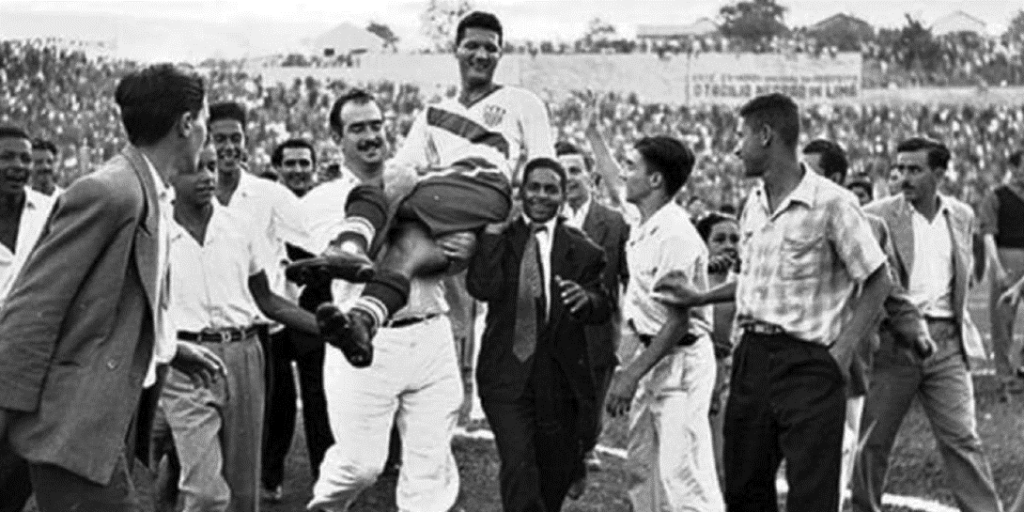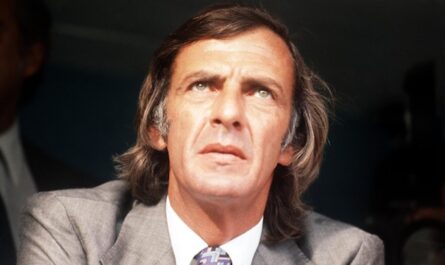Le 29 juin 1950, à Belo Horizonte, la sélection étasunienne battait la prestigieuse sélection anglaise. L’unique buteur du match s’appelait Joe Gaetjens.

D’Haïti au Brésil en passant par New York
Joe Gaetjens est né dans une famille de la haute société de Port-au-Prince le 19 mars 1924. D’ascendance allemande, les Gaetjens étaient installés en Haïti depuis quatre générations. Très jeune, Joe se mit au football. A 14 ans, il rejoignit le club de l’Etoile Haïtienne avec lequel il remporta deux fois le championnat, en 1942 et en 1944.
En 1947, le jeune Gaetjens partit étudier la comptabilité à Columbia University. Il y trouva un job à la plonge dans un restaurant de Harlem et continua le football, dans un club de l’American Soccer League : Brookhattan. A cette époque le soccer était cantonné dans les milieux estudiantins et les quartiers d’immigrés. Il était pratiqué par des amateurs et des semi-professionnels sous-payés : Gaetjens gagnait 25$ par match.
Sur les terrains de l’élite, Joe Gaetjens avait connu Walter Bahr. Bahr était de trois ans son cadet, d’origine allemande comme lui. Il vivait et jouait à Philadelphie. Il avait participé aux Jeux olympiques de Londres avec la sélection étasunienne (défaite 0-9 contre l’Italie dès le premier tour). C’est lui qui proposa au sélectionneur William Jeffrey, nommé deux semaines avant le début de la Coupe du monde 1950 à laquelle devait participer les Etats-Unis, d’emmener Gaetjens au Brésil. C’était la veille du départ. Mais il y avait encore une anicroche : Gaetjens n’avait pas la nationalité étasunienne. Il fit donc une demande officielle qui, le temps d’être étudiée et refusée, lui permit de porter le maillot de l’équipe nationale.
Presque toute la sélection étasunienne était à l’image de Gaetjens : bâtie avec amateurisme, à la va-comme-je-te-pousse, sans préparation. Cinq joueurs étaient originaires de Saint-Louis, Bahr était enseignant la semaine et footballeur le week-end, le gardien Frank Borghi conduisait un corbillard pour gagner sa vie. La plupart n’avait jamais joué en équipe nationale. Un seul journaliste prit la peine d’accompagner les joueurs au Brésil : il travaillait évidemment pour un canard de Saint-Louis !
De Belo Horizonte à Port-au-Prince en passant par Alès
A Curitiba, le 25 juin, les coéquipiers de Gaetjens tinrent tête aux Espagnols pendant 80 minutes avant de craquer (1-3). A Belo Horizonte, dans le stade de l’Indépendance et devant 10 000 spectateurs transportés par leur courage, les Etasuniens battirent la prestigieuse sélection anglaise (1-0). L’unique but de la rencontre fut signé Joe Gaetjens. A la 37e minute, Bahr envoya le ballon dans la surface de réparation anglaise et l’attaquant des Etats-Unis surgit pour le propulser de la tête au fond des filets. L’inconcevable s’était produit grâce à l’agilité et la ténacité d’un étudiant haïtien. Il n’existe aucune vidéo de ce match, pas même une photo du but : tous les photographes étaient en effet massés derrière le but étasunien. Les journaux anglais crurent d’abord à une erreur, le New York Times à un canular.
Battus lors du dernier match par le Chili (2-5), les joueurs rentrèrent aux Etats-Unis où ils furent accueillis par l’indifférence et leurs épouses (pour ceux qui en avaient une). Le seul hommage qui leur fut rendu est un livre larmoyant, sorti en 1996, dont Hollywood fit une guimauve en 2005 avec un mannequin haïtien dans le rôle de Joe Gaetjens.
Après la Coupe du monde, Joe Gaetjens effectua un bout de carrière en France, d’abord au Racing Club de Paris puis à Troyes et Alès. De retour à Haïti en 1953 il y fut accueilli en héros et disputa un match avec la sélection contre le Mexique le 27 décembre. Mais, souffrant de saignements de nez chroniques, il dut raccrocher les crampons. Il se maria en 1955 et eut trois enfants.
Bien qu’il ne s’intéressât pas à la politique, celle-ci le rattrapa. Deux de ses frères, exilés en République dominicaine, étaient accusés de préparer un coup d’Etat contre le président François Duvalier. Lorsque ce dernier se proclama président à vie le 7 juillet 1964, à défaut de pouvoir mettre la main sur les frères de Joe, il se rabattit sur l’ancien footballeur. Gaetjens fut enfermé dans la prison de Fort Dimanche où le régime meurtrier de « Papa Doc » pratiquait la torture et les exécutions à minuit. C’est là qu’il mourut, anonymement, probablement exécuté pendant l’année 1964.





Et il y avait un Belge dans cette équipe US qui défit l’Angleterre : Joe (Joseph) Maca, toujours pas naturalisé US à l’époque, et qui en Belgique avait joué avec Raymond Braine (reconverti en défenseur) à la Forestoise, dans la banlieue sud de Bruxelles.
En voici une photo rarissime :
https://scontent.flgg1-1.fna.fbcdn.net/v/t1.6435-9/39245204_2574179969474382_4841078662633619456_n.jpg?_nc_cat=110&ccb=1-7&_nc_sid=825194&_nc_ohc=6CukgqHDp44AX_y9veU&tn=PEeUtDp5ne1iYVF8&_nc_ht=scontent.flgg1-1.fna&oh=00_AfDE5BHLKulaVoL_oDBqgnVMPkjX5X4-GijtD6qnzFCrCg&oe=63A75259
Même époque, devinez quel est ce gardien qui dégage devant, euh.. Jean Mathonet, futur international du Standard?
https://scontent.flgg1-1.fna.fbcdn.net/v/t1.6435-9/46429765_1897234327061162_6795880792015765504_n.jpg?_nc_cat=102&ccb=1-7&_nc_sid=825194&_nc_ohc=EkMcX3uVZ_gAX8riOTi&_nc_ht=scontent.flgg1-1.fna&oh=00_AfCWMUVSS69RvIwgugb0By6znFf0oxSkpnat8T7ojerlTg&oe=63A76938
Quand même préciser ce qu’elle a de rarissime : elle est erronée!
Le joueur sur la photo, quoique estampillée « Maca », est en fait Harry Keough.
Pour situer à quel point ces joueurs étaient inconnus des observateurs, lol.. et s’imaginer le retentissement de leur victoire sur l’Angleterre?
Le vrai Joseph Maca :
data:image/jpeg;base64,/9j/4AAQSkZJRgABAQAAAQABAAD/2wCEAAoHCAoJCQoKCQoJCgwJCQwJCQkJCR8MDQoZJSEnJyUhJCQpLjwzKSw4LRYkNEY0OD0xODZDGiRITkhAPy40NTEBDAwMBgYGEAYGEDEdFh0xMTExMTExMTExMTExMTExMTExMTExMTExMTExMTExMTExMTExMTExMTExMTExMTExMf/AABEIAMkA3AMBIgACEQEDEQH/xAAcAAEAAgMBAQEAAAAAAAAAAAAABAUDBgcCAQj/xAA9EAACAgEDAgMFBQcCBQUAAAABAgADEQQSIQUxEyJBBjJRYXEUI4Gh8EJykbHB0eEk8QczQ2KCFTREUnT/xAAUAQEAAAAAAAAAAAAAAAAAAAAA/8QAFBEBAAAAAAAAAAAAAAAAAAAAAP/aAAwDAQACEQMRAD8A7NERAREQEREBERAREQERImv1lOh09mp1Liuqldzt3P0Hz/vA96rV0aVN+ptrqXtusbEqLPazpKA/6ktg7fJUTOc9c61d1fVtc4autDs01DHisfP5/wApDUkkZckhcgQOg9Q9ttKFCaBLLbHyBZYuxE/vNbu9qOouc/bLaz6KqhQZTGl925Ax54VeSJgXyHLLkjOARxAvl9q+qp5k1djAnAF1Kupl30v26HiLV1anwQ5wuqpB8P8AEf7zTBqbBvRlGVwyKBMq61PLmkHA2HxBwRA7JVYlqLZW6ujqGV0OVYfKZZy/oHVdR0vUAVk2aS1vvNMOQv8A3D4d/ocTpiOrqGUhlYAqw7EQMkREBERAREQEREBERAREQEREBERAREQE5b7e9bfVdQOgqc+DoXAsAPFln+M/hzOpT8/W2s113iMS32m02OwySdxzAkJVZY+2sKTtI4OBLjT9KcbDZYBgZIMjaC2upQ7bsizDHuGkx9dWqtyUY4QKT6QLTS6emtCp2hiNpI43TJZ0qpxuBHfcGAxia9Z1G0MCHYkAbFA8pk7RdRstC7ssSduAMZgXej6RpEGWAsJOCT3lqnTdE9e1qa2VgBgrNbTWWAbl3CytvMrNhXk7RdQvY+cgbTyoGcrAs7elaY7Urr2ENkEDgSZ7LW6jw9RptRyNLaBS3rtOePy/OYtLrVtXjPHByMGTumOPtVigDz0iwkHOef8AMC3iIgIiICIiAiIgIiICIiAiIgIiICIiAnA/aLTtpOt9R0zeXbrXsXAxlW8w/n+U75OQf8VdH4PWaNUmP9bosOOxDKcZ/gR/CBrKah0VlyMN252lpKTxLFyMsQnPG6RNNpvEUDzHI4HwltVf9nHgqEVSAbbLBtbPwgY/tNQC+OBu9w7RnbiW2i1WlAXBJVCLDYF8olNZq9Exd9Qzkqdm1HwXkcdX0tQevTpZssGLKwOGgbrfSjuxDqAUVySeSJm0wSvaWdmIGAD5iJpOg6jq7rLGRbPDGnsrOwc4xPXSfaNtGVW5fFQ4LA8vA6bW4eseFjB7YHeS+hZ+1XBsbvB4APbmal0r2q0WoCLzQxXisnhflNu6CVsvstU53U4Ax8/8QL+IiAiIgIiICIiAiIgIiICIiAiIgIiIGt+3PUtR03omov0jbL2eqimwLuKbjjP1xmck6hrdX1HB11tupuqUJp3ubjb6j9d51j/iFWG9ntW5BPgWUX4AyeHH95yHoyV3X22apifDBKVk8Z/QgSNPTZTX94cMQGUb/dkHVW32OyuvvEgEDBBli6DZvyznBXcxwVMwfaVUgbAu2spkjG6BTmonO7Pfacek8tTgZGeCBgr3mzaTT16isZ2JknDOPKZX6oh7xVWFY7hjy+VYGx+wSqfErcbgy+ZXXHEoOudAt6bq7FCMaDYzUuiZ8s2D2XB0+rXd2bIJJyTNy1vho2bNu2w4BIyBA5n0n2dfW1+JTbZW6N5fErwuZuduv1vROn6Sz7uy9NXRpbXHuOpbH9ZYsK6VLBFGTkEcSt1OqTV6nT6F0Fi6qxcce6QQf6QOkxEQEREBERAREQEREBERAREQEREBERAia/R163S36S4Zr1FLUuPgD+vynHusdH1PR7kptQolaqp1pXamp/H9ETtkw6iirUVvVeiW12KVet13KwgcC1t4qdqzg4bghskSsd8su7LFjkZPIk3rOnGl1uq0zEudJqbdLuPJOGkWivxLK84CggcjAEDK97oFr3EAtu5OFWRle6km9RlmUrwM4ma4rusPG0Lhcj3pjN4YeYgKVKgZ5gZNP1jU1urK5DAg4B7zbf8A1bquv6Re5pG2tFau4HDkj9fjNU0lfT32m662tgxypryDN80fUNENGBpmLoAtdiONrJ9YGLpfUW12kDlfMFCuPh+sTYvZrSePfXbsyuncv4rJnPyz+u01nR1V0eM1YwrBrA3bE6X0Kvw+maNSMf6dHwPnz/WBYxEQEREBERAREQEREBERAREQEREBERARE+QOE+1Kb+u9W2ng6+z0wM/oStpqw4YbeM4zxLDqtg1Gv1l2fLdrL7EJGe7GRgoHyycZYZMCO+mDsV3bO4UA8NMSdPV38PeqMDsBYdpOrXnGOD65xMVuksazKV2ZIOT3gZqfZbW3H7ttOQWKgmzGY1PQ9boFLll2kqjLWxzJPT6eqZU1JbtDeZnHlmz2V2NSq6jLs2BZ6tAidJ01l9FFIBD6mxKRluT+v6Tq1Va1oiJ7taqij4Af7TVPZHp6eM2pI40y+DSCOcnuf4fzm4QEREBERAREQEREBERAREQEREBERAREQEq/aDV/Zem6tw21jS9dXOPMRx/P8pm6j1LS9Pr8TVWqgwdqZy9n0HrOc+0PtC/URZjyKqFq6y2Qo/vA1W3BwCMYAyQODI6vgevBznvPlt3vHceTwSMyI1rdiTjt35MCclm0jONvcEjiTdN1U1OA6hlO1QD+1Nf8dxyGPHGCd08m0nnucZKjuIHRtB1jTowQDjhBtkzX6mu0Yrw/nAJU4nOdD42osArc7iNoyfdm29PPh7K2Y2sOTuOCIHQ/ZML9gbGSftLgk9/SXs1X2b1qUO2msIRbz4lLE8bvUfl+Rm1QEREBERAREQEREBERAREQEREBExvYqd+T8ByZhZmcc8Kf2Qe8D3Zeq8L5mHoDwJrHtH1vXaAjwzWiWKdtoq3kGXx7egx6dpC6roa9fpnofAJG6t/VGgcz1l76ixtRbe9rk+V7nyRKey4+baByQpyfellr9FdpbnrZmXY+xkK+sqbn3uSQNxO04OBAiWvk/gMjOQJgPI5PY+vrMzhCSOBk8kjtMbfdtg4OOxxAwsmSAuRngkz74fIz6ngfGesHGf4gd4G7P08wx6QL/wBm9OqOxbhgGsTniW9Nfh3rv83i5bI/Y/WZS9Esd7BXgHceSxxsmyojbvEfaFVch8c4gS21QreqoKAxBKljnibN0fqzBVrtY2qBw2cus01FbUW+KoK5Ty5HYS96PWd2ck4UZJgbxXYlih0YMp7ET3Nfpteli1ZxnllPKvLXTaxLvL7r4yUJgS4iICIiAiIgIiICInhm2jJ9PQdzA+swUZP4D1MwsztwPIPlyxnzO45Pc/PtEDyBgcTyZ6zPJgeDBE+z58YFD7R9FXX1GysDxa1ydvBsE5nq9E9Rx4Z272yezL+sTs7Dj6TWvaToP2tW1GkAW4D7xAOLR+v4wOWvWpcbjgA4L+kmv0Oy2vfU6OwUsAP2pn1WkUFgcjDFQCOVM99L1dmmcI5DqeUKj3IEBOlXvprAFYWVls1YwT+vzlY6W1OVsrIPbtOmabbuDmsjxMK5Vsq0wdd6MltYeutdyklcGBrXspV4+p+8A8h4yuJtmtqUiuitl4O6zAzn5TWdFXfoLDsYbSfMcZJlzRqMNl97ElTzwIFgEA5AKnAUgesuNBX4dPPBbzSBoK/tFgzkKnnfIlyuB24wOB8IH3+sY+vHIOe0A9vnAP59jiBN0+vZAFuyw7bwOVlorBgCpBDDII5Bmv8Ap+JkrQanw22OfIxwpPZDAuIiICIiAiIgJGsbc3yXIHzmWxtqkjueBIp7fTtA9qf1ifT+szGjd/l34ml+0mu6j0rWm3T32fZ71ytbnclbwN27/hPn9pz+j271FYA1NFN/HJrbY8ttB7b6DUXpVYtmn3nb4ljZRYG1Y+vE84/zPSOrqGRgysMhgcgwYHgj854ZOePwmUiNsDWuu9CTUZvorUWAZesDb4k0m/pjCyzagRq8K6EYP4TrJX/MrOp9Kr1f3iYqtHAcDhvrA0Lpeqemzw7iTXkLWCc4MstVrbFJqr5D8g4yFnrX9JcLt1VQRgzIl1YwrTHXpglTLlywIXJGMiBEWokMpG5XKkk95m02hezagJJJyB32GWmm0viYCVkdskjgS402kr06YHJySWxA+aTTDT1BAcsfM5+MzE/2n319Z8P8oAf7z639fjPnf+HefTz/AHMD7jy/Q5nzg8fKB7n/AJd8z79PygW+gu8Svaxy1eFY/GS5SaW3w7VbIwTtf5iXQgfYiICIiBG1DAYHwBYgCYC/H1HwnnW2bbtvPKDnMwOfuxyeR3HEDMj4U855lX1vRJ1PSXaVtoZl3V2EZww7ScjYr5zwccTEXAsUAjI5BPGYHF7t9bvXZuVqyUcjgg/oTFu5BYt5jzgczYPbPQHSdXvxgV6n/VV8cNnv/Ka+qk9+4AJ4gbN0/wBpdX0zT11achiT4jJd56wJtOg9uNNYo+20tQTgCys70M5q3HHLMKypIGSs912HzKQOcEZ7wOzaHrOg1gH2fV0OTkBDZtf+EsfT+s4E1hSwFfJgggjgibT0r2n1unqArtNipgbLzuBEDqZH5zww+Xeax0r220WocVasfZXwALCd1bGbOro6hq2VlYZDKdwaBF1+lTU0WVP+0OD6qZp7C1rvswH3hfwyMdpvLD6SH9kpXUPqBWotdQpfHeBi02nWitUGCQBk4xmfXb8jiSHEwuufhx8YGL4zzn+XYz03Ge/EitZl2Azwm/A7QJKz6T9OMGV1mou8U01qCwr3kscATHp9XZXZ4eoAU8YwciBbY8hz8QYE8parIw49PWegfr8+IH0DPEutI/iVKT3AKtKdfw/GT+mv76H5OB+vpAsYiICInwwKXqpK6gMM+VF4AzmY3vUfd/8A1rDnHM+dUuP2lgo4UohIPb9ZkSzeH8THlfTBOOOcwMyv93Zt3ZFgOc8NMGotKujkFcsMFjmfV5pu/wC1Q6GYrvONPY2GyCHzzmBWe22jGs0IvrBNulKvx7xU95zrY2Vb4dp1PUu1njV5XD6fCk9hOeajStVYUdDWy4BUnOYEEjJyN2AfTgGfXwBkE98AYkg0+c+6ckEHdnE8umAOAcjkeogQbMMeAcj1zwZKqdtnGAfcBxPDVbj9DnJHaZ602DJAPHGRAxlUXFZIXdwGxkmWHTuua3pTj7LcxrBAaiw7q2lbarHacHynOCcyRYm4g8eZRnHYQOhdG9tNDrCK9XjSXEAeds12fjNkDq4DIQysMhgcgziTV4Zs8gZyDzibD7P9X1PTq/K7WUgjFDncMQOlN+uZiaQ+n9X03UEzVYN2AzVMcMslE/SBjceU/MGV7DwilpcbWK1lSJZNz8PpKnqr+GmnXnzautQAO0DMKwL2s9GXZxziYra0fUIxzgHGCIZfNZz7urVs5kaxr0PUilh8tieEGGQkC0Y4O5cEEgHEkgD+Mh6Yl7LEYLiuutgRxkyZ2/kOYH3dxxJPT326hBn31ZTz+vhIRfkDjkzLpm221t6CxcnPb9ZgbDE+T7ARE8v7p/dMDV7n8RrX589rMQB6TK/NC/EYIz6TDV/y/wADM3/SX6CBj0w8lin3XHbOZFcEV4HPh2AgegknT+8foJiu9yz99YEd13W7jwqrzgyBZp9PqrN2prLYJxt4Jkq/tf8AuCeNP7i/WBXanoFbnfo/ETP/AE7DkSvv6Hqq+TSzAftVjcJudfp9BJqf0gcwOjdfeVhxgAjbB03l7Dj85u3XP+WJrDev4wKx9LnHHHHp3npNOR5QBx8OCJYt3/CeV7fwgVjaU7vXJ5z3zJVFOPK2VyNvHrM47/iJ79T+ECE9dunsDIzI4O5XrODNl6T7ROR4esU8YAuHP8ZSP6/WeKu5/dgb+lyWIHrcMrAEMDxIuu03jGls7fDvWw/OQfZ//wBt/wCZlu3b8YFaHydUTjC6pcGerVAbWdxuRXPPEj2f8vV//rWZdT/8n9yuBP0zeez4GtMSSW79uOZH0v7X7izK3r9IGJD5iecDtMiuRg8cENMI7fjMh938IG0jn+c+zynuj6CeoH//2Q==
Interview du fils Maca, traitant de son père et, évidemment, de la WC US de 1950 (il y a un invité-surprise auquel Verano consacra un article, c’est assez rigolo) :
While American soccer fans like to revel in what is considered by many to be the greatest upset in World Cup history, they tend to forget what it meant to the rest of the world.
“There was so much involved with this upset,” Alain Maca said. “It made the world so happy.”
Alain Maca is the son of Joe Maca, a starter of the U.S. team that stunned England, 1-0, in the 1950 World Cup, relayed this story. Today, Alain Maca is best known as being the very first draft pick in American soccer — with the old North American Soccer League in 1972.
Joe Maca passed away in at the age of 61 on July 13, 1982.
The 1950 World Cup was the first competition since the end of the Second World War and the first in 12 years. The World Cup was still in its infancy — it had only been held three times prior — and England had refused to play in such an event.
“For Belgium to be at that level in a World Cup to beat England, you have to understand how arrogant England was in those days. Not that it’s changed, so to speak,” Maca said. “To beat some of the legendary players — Stan Mortensen, Tom Finney — these are legendary names.”
One day Maca was sitting at work at JFK Airport and he received a call from the manager of Sam Adams publicity. He was told he was he soccer player in his office.
“Maybe you’ve heard of him — Jimmy Johnstone — a famous soccer player,” Alain relayed the story.
“Jimmy Johnstone? Sure I’ll be right down. We started talking,” he related.
Not surprisingly, they talked about their favorite sport.
“Jim, you’ll appreciate this,” Alain said. “My dad played in the 1950 game when we beat England.”
Johnstone’s reaction?
“He went nuts,” Alain said. “He said, ‘My two favorite moments was when we beat England at Wembley and when I heard the U.S. beat England and I could stick it in their face.’ And this is one of the greatest soccer players of all-time out of Scotland.”
Joe Maca truly never had an opportunity to play during his soccer prime as Germany occupied his native Belgium between the years of 19 and 25. He had performed for Royal Cercle Sportif La Forestoise of Brussels in the Belgian Third Division. He served a year in the Belgian Army, where he played on the Army team, earning a medal for his role in the resistance.
“My father, he wasn’t even a citizen when he played for the U.S. team,” Alain said.
Switzerland sponsored Maca when he came to the U.S. and wound up played for a Swiss club in the old American Soccer League.
“They recognized right away he was a special player,” Alain said. “They threw him on the U.S. team, met the guys. Off to Brazil they went.”
Alain said his father wound up playing at left fullback, although that wasn’t his position. He should have been playing midfield. That’s where he belongs. But’s the way the [the team] was set up.”
It was right after World War II. The World Cup was still in its infancy — it had only been held three times prior — and England had refused to participate in such an event.
Despite the great upset — Joe converted a penalty kick in a loss to Chile — the U.S. team was eliminated after the opening round. The three games were the only three Maca had played in a USA uniform.
When Joe Maca returned home to Belgium, he received a hero’s welcome.
“For Belgium to be at that level in a World Cup to beat England, you have to understand how arrogant England was in those days. Not that it’s changed, so to speak,” Maca said. “To beat some of the legendary players — Stan Mortensen, Tom Finney — these are legendary names. When he went back to Belgium, he was a hero.”
Maca wound up playing two years with Royal White Star Athletic Club in the Belgian First Division from 1950-51 before he returned to the U.S.
“That’s why I was born in Belgium,” he said. “I was actually made in America and delivered in Belgium.”
But Alain Maca grew up in the United States — in Massapequa, N.Y. — which turned out to be one of the hotbeds of soccer — youth and amateur — in the country.
Joe brought his 19-year-old son, Alain, back to Belgium, for the first time in 1971.
“The next day, the whole back page of Le Soir, which is the biggest paper in Belgium — was Joe Maca,” Alain said.
The back page featured six pictures of Maca and a story.
“Joe Maca is back,” the headlines read.
When he was in Belgium, Alain trained with Anderlecht with the likes of Paul Van Himst and Francois Van der Elst.
“The feedback my father got was, ‘If the kid comes here for a year or two and works his ass off, maybe,’ ” he said. “Don’t forget, I’m already 19-years-old. They already see you as a little old. I was far behind the other kids.”
Alain admitted he was a different type of player than his dad, of which he was very proud.
“When Joe Maca walked into the stadium, a lot of people would walk over to him,” he said. “I was the son of Joe. I’ll tell you, I couldn’t be more proud. Everybody used to laugh; ‘Hey Joe, he doesn’t play like you.’ ”
Alain then laughed.
“I was a different kind of a player than my father,” he added. “At that level I was playing stopper. I was a hard player. I was really good in the air and strong on the tackle. My father was an unbelievable soccer player. He was strong on the ball. He could do everything.”
Including what many soccer observers some 70 years ago thought was impossible — shake the world and pull off what was considered impossible at the team — beat England in the World Cup.
Super Bota ! Jimmy Johnstone n’avait pas six ans en 1950, on peut dire que la haine de l’Anglais se manifeste tôt chez les cathos écossais 😉
Merci Bobby. Crois tu aux rumeurs affirmant que c’est Papa Doc lui meme qui aurait assassiné Gaetjens? Quand j’avais fait mes recherches sur l’équipe haïtienne 1974, j’avais rencontré cette version.
Il y a le même article aujourd’hui sur So Foot.
Avec la même photo de garde. Hehe
Et d’ailleurs, quid de sa carrière française?
J’ai lu que la mort de Gaetjens n’a ete officialisée que 6 ans plus tard.
Toujours un plaisir de lire tes papiers bobby!
Pour la première participation des Anglais à la Coupe du Monde, quel camouflet !